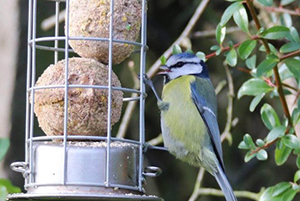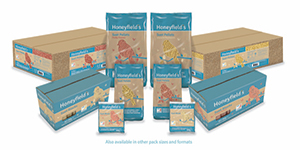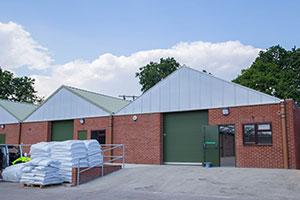Bournemouth-based Drewlec, the electrical services arm of The Drewitt Group, has designed and installed mechanical and electrical works to the new landscaping facility at Stewarts Garden Centre, Broomhill.… Read more
Help your customers attract migrant birds, with tips from Honeyfield’s
Spring is in full swing and many vibrant migrant birds from Africa are arriving in UK gardens for the breeding season. Honeyfield’s resident wild bird expert Simon Smethurst, who is head of sales at Honeyfield’s, is sharing tips on how your customers can make their garden a 5* nesting environment for many of these stunning transient species.
 “Redstarts, Pied and Spotted Flycatchers, Blackcaps, and Willow Warblers are just some of the migratory visitors we can expect to see in our gardens each year,” said Simon. “All of them are primarily insectivorous, making traditional seed feeders less appealing. However, with the right feeding strategies, your customers can create a welcoming haven for these visitors.”
“Redstarts, Pied and Spotted Flycatchers, Blackcaps, and Willow Warblers are just some of the migratory visitors we can expect to see in our gardens each year,” said Simon. “All of them are primarily insectivorous, making traditional seed feeders less appealing. However, with the right feeding strategies, your customers can create a welcoming haven for these visitors.”
Simon advises your customers to:
- Choose the right feeders: Hopper feeders, ground feeding stations, or bird tables are ideal for these species, as they mimic their natural foraging habits.
- Offer suet-based feeds: High-quality suet pellets or blocks enriched with dried insects or mealworms, provide the perfect combination of protein and fat to sustain their energy levels during migration and breeding preparation.
- Replicate a natural feeding experience: Scatter some mealworms or small suet pieces directly onto ground stations or tables.
- Create an insect-friendly environment: Planting native shrubs and wildflowers can attract a variety of insects, offering a natural food source for these birds.
- Provide water sources: Setting up small water features for drinking and bathing can make your garden even more appealing.
- Encourage shy and selective feeders: Place feeding stations in quieter, sheltered areas, surrounded by foliage for safety and cover.
- Provide a tranquil environment: Avoid abrupt movements or loud noises that could deter incoming birds.
- Keep food fresh: Supplementary food should always be fresh and in appropriate quantities to prevent waste and attract the birds you wish to see.
“With a little preparation and the right food offerings, your garden can become a vibrant haven for these remarkable spring migrants, allowing you to enjoy their striking plumage and melodious songs while playing a vital role in supporting their journey to breeding success,” said Simon.

Honeyfield’s offers an exceptional range of wild bird feeds designed to support wildlife throughout the changing seasons. Honeyfield’s suet blocks and suet pellets are premium, energy-rich feeds designed to support wild birds, especially during demanding periods like nesting and fledging. Packed with essential nutrients, they provide long-lasting energy, helping birds thrive. Easy to use and highly palatable, they will attract a variety of species to your garden.
By choosing Honeyfield’s, you actively contribute to the health and vitality of local bird populations, fostering a vibrant natural environment all year round.
The range is competitively priced and available from your local stockist.
To find out more about the Honeyfield’s range visit: https://www.honeyfieldswildbird.co.uk/
- Log in to post comments

